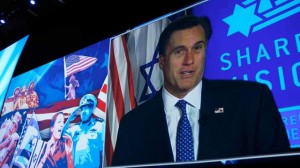
Mitt Romney, seen on screen, speaks before the American Israel Public Affairs Committee (AIPAC), via satellite in Washington, Tuesday, March 6, 2012. (AP Photo/Charles Dharapak)
In the editorial, Romney recalls the 1979 Iranian hostage crisis that helped Ronald Reagan defeat President Jimmy Carter in the 1980 election. He writes:
America and the world face a strikingly similar situation today; only even more is at stake. The same Islamic fanatics who took our diplomats hostage are racing to build a nuclear bomb. Barack Obama, America’s most feckless president since Carter, has declared such an outcome unacceptable, but his rhetoric has not been matched by an effective policy. While Obama frets in the White House, the Iranians are making rapid progress toward obtaining the most destructive weapons in the history of the world.
(Asked about Romney’s “feckless” characterization at today’s White House press conference, President Obama referred instead to the “Super Tuesday” primaries and told the former governor, “Good luck tonight. No, really.”)
Romney claims he will take “every measure necessary to check the evil regime of the ayatollahs” and lists what he says he would do if he were president. But how different are his ideas, really?
Not that different, writes New York Times reporter Helene Cooper in today’s paper:
“To rein in Tehran’s nuclear ambitions, Mitt Romney says he would conduct naval exercises in the Persian Gulf to remind Iran of American military might. He would try to ratchet up Security Council sanctions on Iran, targeting its Revolutionary Guards, and the country’s central bank and other financial institutions. And if Russia and China do not go along, he says, the United States should team up with other willing governments to put such punitive measures in place.
As it turns out, that amounts to what President Obama is doing.”
Two developments this morning indicate that the U.S. sanctions may be achieving their desired effect. Iranian officials agreed to allow UN investigators to visit a military complex where they suspect that Iran is working on an atom bomb. And, members of the UN Security Council – Britain, China, France, Russia and the United States – and Germany announced plans to resume talks with Iran.
Previous talks broke up last January when Iran refused to discuss their uranium enrichment program. According to The Guardian, the hardest line in re-opening the talks was taken by the French, who insisted “that in order to satisfy Israel that all was being done to resolve the nuclear crisis by peaceful means … the talks would have to end with the ‘full implementation’ of UN security council resolutions calling for the suspension of uranium enrichment.” Iran agreed to the terms.
There is no word yet on when or where the talks will be held, but for Israeli Prime Minister Benjamin Netanyahu, they can’t come soon enough. “None of us can afford to wait much longer. As prime minister of Israel, I will never let my people live in the shadow of annihilation,” he told the 14,000 members of AIPAC in Washington this week.
Whether the Iranians are ready for serious negotiations or using the inspection and talks as a stalling tactic to hold off the Israelis, don’t expect the Iranian crisis to fall out of the campaign rhetoric anytime soon.
As Suzanne Maloney observes in this month’s American Prospect magazine, “For American politicians, talking tough on Iran is the foreign-policy equivalent of kissing babies—it may be clichéd, but it works.” At his news conference, President Obama told reporters, “What is said on the campaign trail, you know, those folks don’t have a lot of responsibilities. They are not commander-in-chief. And when I see the casualness with which some of these folks talk about war, I’m reminded of the costs involved in war … This is not a game, and there is nothing casual about it.”

